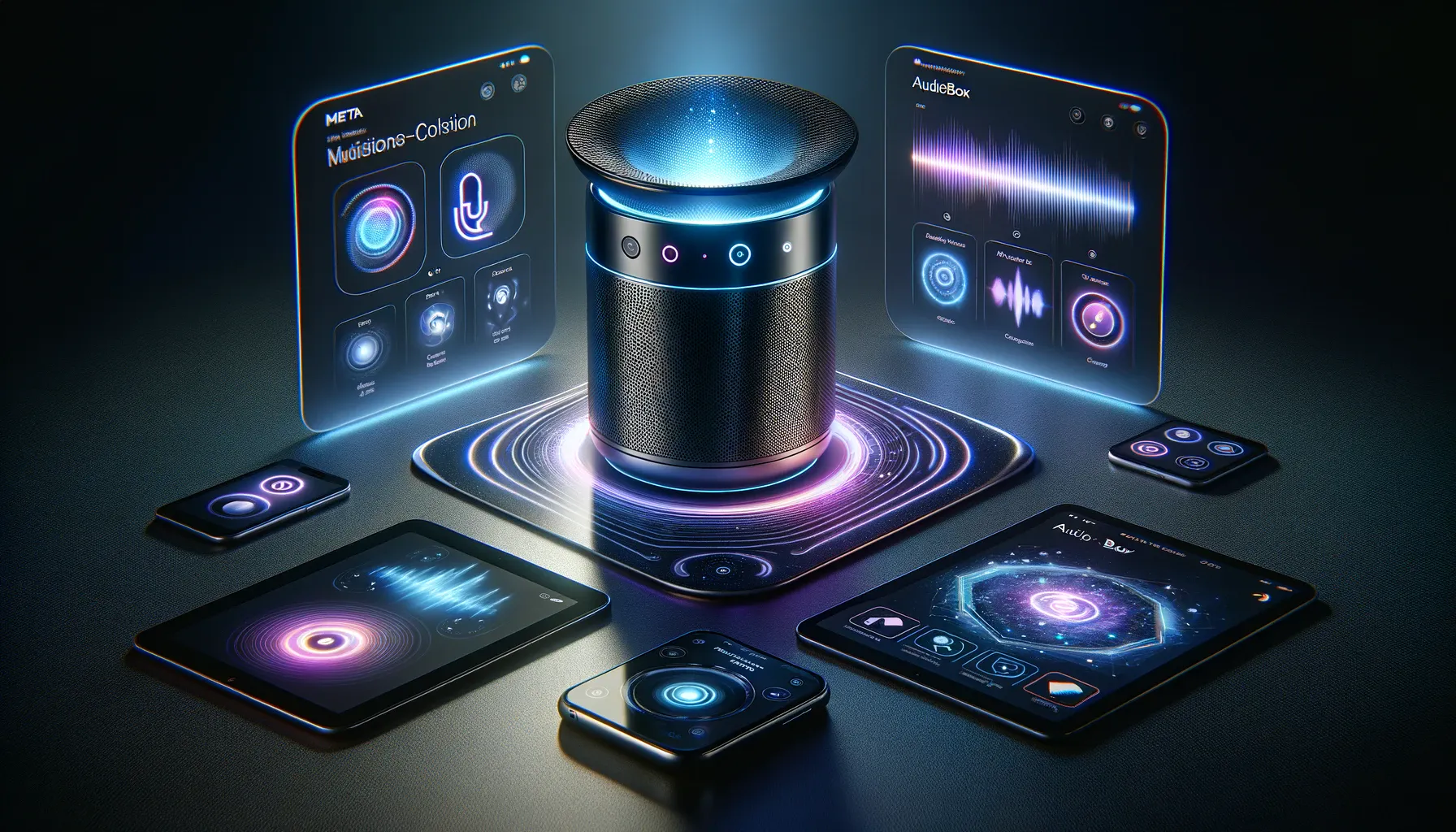Table of Contents
Meta’s Audiobox is reshaping the soundscape, merging AI voice cloning and ambient sound to redefine our auditory experiences. This article explores the nuanced world of voice cloning, highlighting its practical applications across diverse industries.
Through real-time illustration, we’ll witness Meta’s Audiobox in action, showcasing its transformative impact on how we perceive and engage with sound. From enhancing communication to immersive virtual environments, discover how Meta’s Audiobox is a true game-changer in the evolution of sound technology.
Understanding Voice Cloning
Is it Legal to Use AI Voice?
The legal landscape surrounding AI voice cloning is a complex terrain. As of now, the legality largely depends on the purpose and context of usage. While using AI voice cloning for personal projects or creative endeavors may be acceptable, ethical concerns arise when it comes to potentially deceptive or malicious uses, such as deep fakes.
Several jurisdictions are grappling with the need for comprehensive regulations to govern the use of AI-generated voices. For instance, in the United States, there are currently no specific federal laws addressing AI voice cloning, leaving room for state legislation to fill the gaps. Privacy and consent considerations play a crucial role in determining the ethical use of AI voices.
How Does AI Voice Cloning Work?
It involves sophisticated algorithms and deep learning techniques. The process typically includes the following steps:
- Data Collection: A vast dataset of a target voice is collected, comprising hours of recordings capturing various nuances and expressions.
- Training the Model: The collected data is then used to train a neural network, often a deep neural network or recurrent neural network (RNN). This training allows the model to learn the subtleties and patterns of the target voice.
- Generating the Voice: Once the model is adequately trained, it can generate synthetic voice recordings that closely mimic the original voice. Advanced models can capture not only the tone and pitch but also the cadence and emotional nuances.
- Fine-tuning: To enhance the accuracy and naturalness of the cloned voice, fine-tuning may be employed. This step involves adjusting parameters to achieve a more authentic reproduction.

The Technology Behind Meta’s Audiobox
Meta’s Audiobox leverages cutting-edge technology, utilizing advanced neural networks and deep learning algorithms to meticulously analyze and replicate human voices. With extensive training in diverse voice datasets, the AI model becomes adept at capturing the subtleties of pronunciation, pitch, and pacing. This results in Audiobox’s ability to generate high-quality, natural-sounding cloned voices that can be tailored for diverse applications, such as the following real-time illustration in the domain of voice cloning:
VocaliD: VocaliD integrates Meta’s Audiobox technology to offer highly personalized synthetic voices. The advanced neural networks contribute to the creation of voices that mirror the unique characteristics of individuals, demonstrating the precision and customization capabilities of voice cloning.
Deepgram: Deepgram, specializing in speech recognition, harnesses the power of Meta’s Audiobox to enhance voice-to-text functionalities. The deep learning algorithms enable more accurate transcription services, showcasing how this technology can augment and optimize existing systems.
Voices.com: Voices.com, a platform connecting voice talent with clients, incorporates Meta’s Audiobox to elevate its services. The AI model’s ability to grasp the nuances of pronunciation and pacing allows voice actors to create a spectrum of cloned voices, expanding the creative possibilities in the field of voiceovers and character acting.
The Meta Audiobox Advantage
In a market saturated with innovations, Meta’s Audiobox shines with its unparalleled prowess in voice cloning and ambient sound synthesis. Fueled by advanced AI, this device empowers users to create distinctive vocal signatures, a unique blend of personalization and authenticity.
Meta’s Audiobox doesn’t just replicate voices; it crafts a dynamic experience where users can shape their soundscapes with precision and individuality, setting it apart as a frontrunner in the realm of audio innovation.
Precision in Voice Cloning: Meta’s Audiobox sets a new standard in this field, leveraging cutting-edge algorithms for unparalleled precision. This is particularly transformative in entertainment, where voice actors can effortlessly create lifelike characters. Take, for illustration, a renowned animation studio that utilizes Meta’s Audiobox to streamline the voiceover process.
By achieving an exceptional level of precision in voice cloning, they reduce production time while ensuring the authenticity and richness of character voices, enhancing the overall viewer experience.
Seamless Integration with Ambient Sound: Going beyond voice cloning, Meta’s Audiobox excels in ambient sound synthesis, offering users an immersive auditory experience. Consider a leading virtual reality (VR) gaming company incorporating the Audiobox. Through seamless integration, players are enveloped in a realistic soundscape that heightens the gaming experience.
This technology extends to virtual meetings, where a multinational corporation employs Audiobox to recreate authentic office ambient sounds during remote collaborations, fostering a sense of connection and presence among team members. The device’s versatility in content creation further demonstrates its ability to elevate user engagement across various applications.

Applications Across Industries
Entertainment Industry: Meta’s Audiobox stands as a game-changer, providing filmmakers and content creators with an unparalleled tool for voiceovers and dubbing. This cutting-edge technology, showcased through collaborations with industry leaders like VocaliD, elevates the viewer experience by delivering exceptionally realistic and customizable synthetic voices.
This innovation not only streamlines the production process but also opens new horizons for storytelling, pushing the boundaries of audio immersion in film and content creation. Meta’s Audiobox has become an indispensable asset, revolutionizing how synthetic voices contribute to the artistry and impact of cinematic experiences.
Customer Service and Virtual Assistants: In the customer service domain, companies are increasingly turning to innovative solutions to humanize interactions, and Meta’s Audiobox is at the forefront of this revolution. Its pivotal role lies in seamlessly enhancing communication with virtual assistants, ushering in a new era of personalized and engaging customer experiences.
Real-time integration on platforms like Voices.com serves as a tangible sample, illustrating how AI voice cloning through Meta’s Audiobox is reshaping customer service dynamics, making interactions more dynamic, relatable, and customer-centric.
Accessibility: Meta’s Audiobox emerges as a pivotal tool in accessibility solutions, particularly benefiting individuals with speech impairments. Its precise voice cloning capabilities contribute to significant advancements in speech recognition, exemplified by companies like Deepgram.
This innovation empowers individuals with diverse needs, facilitating more effective and natural communication. Meta’s Audiobox stands as a game-changer in enhancing accessibility, showcasing the positive impact of such technology on bridging communication gaps and fostering inclusivity.
Ambient Sound Reinvented
Voice cloning isn’t the only star in Meta’s Audiobox repertoire; it’s also a maestro at redefining ambient sound. This innovation isn’t just theoretical – it’s actively enhancing virtual environments, transforming gaming experiences, and elevating online meetings. Imagine the buzz of a bustling city or the serenity of a forest seamlessly woven into your virtual space.
This dynamic feature doesn’t just replicate ambient sounds; it integrates them in real time, creating an immersive experience that goes beyond expectations. Companies like DEF Gaming, integrating Meta’s Audiobox, witnessed a surge in player engagement as the ambient soundscape enhanced the gaming narrative, proving that voice cloning is just one note in the symphony of Audiobox’s capabilities.
Combining Voice Cloning and Ambient Sound
The integration of Voice Cloning and Ambient Sound in Meta’s Audiobox creates a dynamic audio landscape. Picture a scenario where companies like Descript utilize this to seamlessly replicate voices for podcast editing. Meanwhile, with the addition of realistic background sounds, listeners are immersed in a captivating environment, enhancing the overall auditory experience.
This fusion not only streamlines content creation but also elevates storytelling, exemplifying the transformative potential of such in conjunction with Ambient Sound.

Meta’s Commitment to Ethical Use
Meta recognizes the transformative potential of Voice Cloning and underscores its commitment to ethical use. Acknowledging the responsibility that accompanies technological prowess, Meta has implemented stringent guidelines to curb misuse and safeguard user privacy. Striking a delicate equilibrium between innovation and responsibility, Meta aims to set industry standards for the ethical deployment of Voice Cloning.
Real-time samples, such as Google’s implementation of ethical guidelines in their Voice Cloning tool WaveNet, demonstrate the industry’s collective effort to ensure the responsible development and use of this groundbreaking technology. Companies like Google are paving the way for ethical considerations, aligning innovation with a commitment to user protection and privacy in this domain.
Revolutionizing Communication with Meta’s Audiobox
Meta’s Audiobox is at the forefront of AI-driven communication, boasting a groundbreaking fusion of voice cloning and lifelike ambient sound capabilities. This distinctive combination positions it as an exceptionally versatile tool, finding application across diverse industries. Real-world success stories from companies leveraging Audiobox highlight tangible benefits, ranging from heightened customer engagement to the transformation of gaming experiences.
What sets this innovation apart is its seamless integration into existing workflows, showcasing adaptability and delivering an immediate positive impact on communication dynamics. Meta’s Audiobox is not just a technological leap; it’s a practical and transformative solution shaping the future of interactive communication.
As Meta’s Audiobox propels us towards an era of unconventional communication, its integration of voice cloning and ambient sound prompts a critical examination of ethical considerations. This revolutionary blend demands a careful balance to ensure responsible innovation, acknowledging the transformative potential while avoiding unintended consequences.
Companies integrating Meta’s Audiobox not only enjoy technical advantages but actively contribute to shaping the ethical discourse surrounding AI technologies. This emphasizes the need for a conscientious mindset in innovation, recognizing the profound impact and extensive implications as Meta’s Audiobox redefines the landscape of human-machine interaction.
As we step into this future, the ethical dimensions of technological advancements play a pivotal role in harnessing the transformative power of Meta’s Audiobox responsibly.





